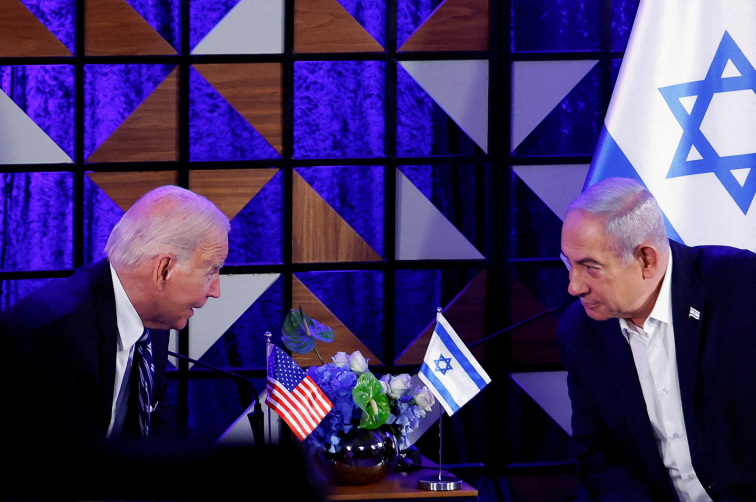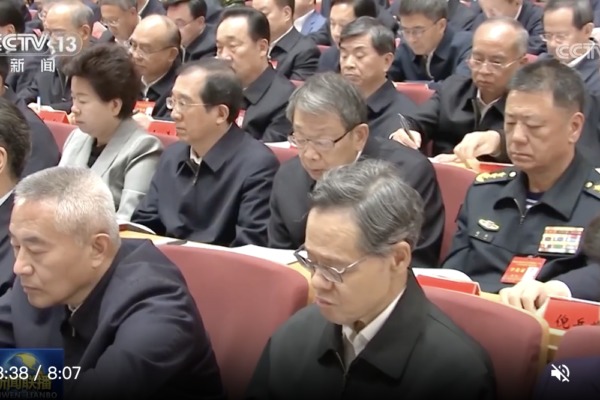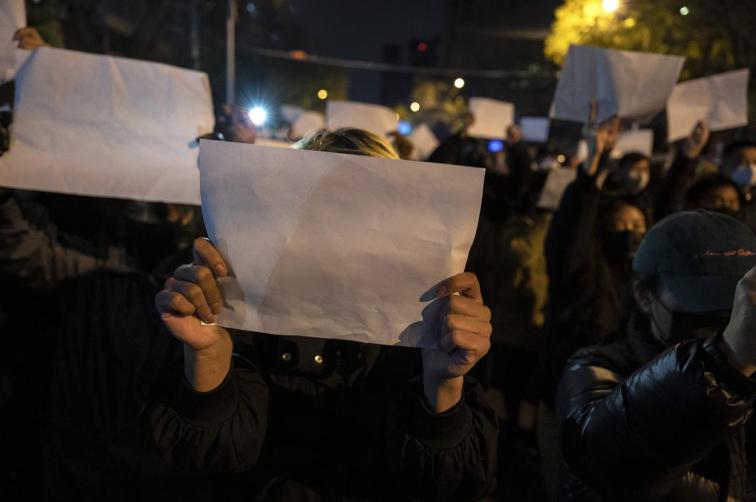Illustration: CCP police dogs and demolition teams conducting security sweeps in Tiananmen Square. (Photo by Kevin Frayer/Getty Images)
[People News] The CCP's Ministry of State Security recently issued a warning, claiming that some university students were interrogated or detained in 'black rooms' by foreign intelligence agencies during overseas study tours. They advised caution against being infiltrated or recruited while abroad. Analysts suggest that the CCP is attempting to legitimize its own infiltration practices by highlighting the alleged actions of its opponents. In reality, the CCP not only interrogates foreign scholars entering China but has even conducted 'backtracking investigations' spanning 20 years."
According to a report by Voice of America, on the 26th, the CCP’s Ministry of State Security published an article on its official WeChat account stating that in recent years, some university groups on overseas study tours have been repeatedly interrogated during border entry. Their personal belongings, such as mobile phones and laptops, were inspected, and some were even detained in "black rooms" at airports. The groups most affected include students and teachers specializing in critical fields such as cutting-edge technology, national defense and military industries, and biomedicine.
In addition to being detained in "black rooms" at border entry points, the Ministry of State Security also claimed that foreign intelligence agencies use methods such as "forced connections" and "sneaking in ulterior motives." They reportedly approach Chinese students and teachers through guided tours, friendship-building, academic exchanges, or offers of assistance. The aim is to build relationships, extract information, emphasize differences between China and other countries, or promote foreign high-quality lifestyles to "brainwash" them, undermining their national, ethnic, cultural, and institutional identities. These actions allegedly pave the way for infiltration and recruitment.
Thief crying 'stop the thief'
Yang Yi-kui, an assistant researcher at the Institute for National Defense and Security Research in Taiwan, commented in an interview with Voice of America: "I think this is a defensive projection by China (CCP), projecting its own behavior onto its opponents and then publicizing that the opponents are engaging in similar actions to justify its practices. Simply put, it’s a form of confusion and distraction."
In other words, while the CCP’s top security agency warns Chinese students and teachers abroad to guard against foreign infiltration or recruitment, it simultaneously uses international students for espionage activities, essentially embodying the idiom "thief crying 'stop the thief.'"
In early October this year, five Chinese students from the University of Michigan were indicted by the FBI. They had been caught photographing a military base near Camp Grayling in northern Michigan in August last year. They initially claimed to be "media" personnel, later said they were there to "watch meteors," and even deleted photos and attempted to cover their tracks.
In June this year, a Chinese graduate student from the University of Minnesota was found using a drone to photograph near the Newport News Shipyard in Virginia. At the time, the shipyard was working on aircraft carriers and Virginia-class nuclear submarines.
Yang Yi-kui believes the CCP’s actions are an attempt to create the perception that Chinese scientists face unfair treatment in the U.S. when, in reality, the CCP treats foreign visitors to China in the same manner.
Taiwan's Mainland Affairs Council has pointed out that Taiwanese scholars traveling to China for academic exchanges have been detained at airports for up to four hours, with their luggage, mobile phones, and laptops confiscated. The latest cases indicate that citizens of any country may have materials containing charts or maps inconsistent with the CCP’s policies seized upon entry.
The Mainland Affairs Council has identified three high-risk groups traveling to China: Those who have publicly criticized CCP-related government or human rights issues. Professionals in high-tech service industries. Individuals active in civic organizations or groups. In October this year, the Council released a short video warning citizens of the risks of traveling to China, Hong Kong, and Macau, emphasizing the importance of personal safety.
Backtracking 20 Years
Dong Liwen, executive director of Taiwan's Asia-Pacific Peace Foundation, shared real-life cases he has encountered with Voice of America. He stated that overseas visitors, especially Taiwanese, subjected to the CCP’s national security scrutiny are "too numerous to count." He personally knows several scholars who have faced treatment ranging from mild harassment to severe torture.
Dong explained that the least intrusive experiences involve having luggage, mobile phones, computers, and other electronic devices searched at Chinese airports, or being taken to a "small room" for questioning that lasts three to five hours. Worse experiences involve being left unbothered at the airport but later confronted in hotel rooms by national security or public security officers for questioning or harassment, sometimes being detained in the hotel for three to five days. More severe cases involve being directly taken from the airport or hotel to a small room at a national security facility for prolonged questioning, lasting from three to seven days. The most extreme cases involve formal detention, where individuals are investigated and prosecuted.
Dong emphasized that the CCP’s interrogations are not casual questioning but rather a thorough "20-year backtracking." He cited the personal experience of a scholar specializing in Chinese studies. According to Dong, the CCP had access to all the research projects the scholar had undertaken for the Taiwanese government over the past 20 years. The interrogation involved meticulously going through each project one by one, asking, for example, where data related to China's food or financial security came from. This process could last at least six months.
"After you think you’ve answered everything, it’s not over," Dong said. "A new group of people would come in and start questioning you about the same 20 years all over again. This is what we call 'torture.'"
Dong shared that the CCP initially suspected the scholar of obtaining classified documents from the Chinese government and sought to prosecute him for leaking state secrets. However, when they found that all the materials were from public sources, they changed the charge to "subversion of state power." The scholar was imprisoned for four years under this charge and was then placed under residential surveillance for another two years, spending a total of six years in CCP custody.
Dong noted, "His experience is universal—this is what happens to everyone who goes, including foreigners. The CCP’s Ministry of State Security conducts investigations by backtracking 20 years of your activities, requiring you to account for everything in detail. Whether you’re guilty or not is for them to decide."
He added that the Ministry of State Security has been continuously expanding its powers over the past five years. On one hand, it has revised national security-related laws, broadening the scope of national security. On the other hand, it has consolidated the powers of legal interpretation and enforcement. As a result, the CCP's concept of national security now permeates every aspect of people's lives and every field, including foreign diplomacy, the economy, military corruption within the PLA, and more, all of which see involvement from the Ministry of State Security. The recent warning to university students and faculty about overseas study tours has developed within this context.
Overseas Infiltration and Recruitment
Chen Wen-jia, director of the Center for National and Regional Development at Taiwan’s Kainan University, stated in an interview with Voice of America that the CCP’s Ministry of State Security warnings are, in fact, projections of its own behavior. For years, the CCP has been actively engaged in overseas infiltration and recruitment activities, targeting government officials, scholars, businesspeople, and overseas Chinese communities to collect intelligence and extend its influence.
For instance, under the guise of “serving overseas Chinese,” the CCP established "overseas police service stations" in locations like New York. These stations are used to monitor dissidents, harass opponents, and even recruit Chinese individuals to assist in intelligence work. This activity led to criminal charges filed by the U.S. Department of Justice, offering a concrete example of the CCP’s overseas intelligence operations.
Another notable case is the 2018 "Caltech Spy Case," where a Chinese student used academic research as a cover to steal U.S. aerospace technology secrets and attempted to transfer them to China. This highlighted the CCP’s method of using academic exchanges for intelligence infiltration in cutting-edge technology fields, warning universities and research institutions of the risks of technological leaks.
Chen said: "China (the CCP) not only conducts espionage activities through official agencies but also hides its operations under the guise of academic exchanges or overseas Chinese affairs. This poses threats to national security in various countries. At the same time, the CCP uses its allegations of foreign espionage as political propaganda to obscure its own actions, deflect international criticism, and construct a hypocritical global image."
Evolution of CCP Espionage Activities
Chen pointed out that to adapt to changing international circumstances and improve intelligence collection efficiency, the CCP has adjusted the scope and methods of its overseas espionage network. While its focus was previously concentrated on the U.S., it has now expanded its operations to Europe and Africa. In Europe, the CCP uses methods such as recruiting through headhunting companies or academic collaborations, targeting political figures and tech companies. In Africa, it utilizes the "Belt and Road Initiative" to establish long-term intelligence networks, particularly infiltrating local governments and key infrastructure projects.
Chen further explained that the CCP’s intelligence agencies are shifting away from reliance on traditional full-time spies to a “proxy model,” recruiting individuals with legal identities, such as students, overseas Chinese, and businesspeople, as part-time operatives. These intelligence activities are often disguised as legitimate daily activities, such as using business delegations to gather information, employing students to monitor dissent on campuses, or leveraging financial incentives and romantic enticements to coerce local officials and foreign government staff into providing confidential information.
Technology has also become a critical tool for CCP espionage activities. This includes hacking into government and corporate systems in multiple countries to steal large volumes of confidential data or using phishing emails and forged corporate correspondence to infiltrate organizations and obtain internal intelligence.
Chen remarked: "Therefore, the CCP's intelligence activities have evolved from a focus on specific regions to a global network, adopting more covert and adaptable methods. This transformation not only broadens the scope of intelligence collection but also presents greater challenges for countries in addressing the espionage threats posed by the CCP."
Academic Integration with National Security
Yang Yi-kui, an assistant researcher at Taiwan’s Institute for National Defense and Security Research, observed that one evolution of CCP espionage activities is the transformation of its military-civil fusion program. What was once purely academic research has now been integrated into national security issues as a means of expanding China’s global influence. For example, drone engine technology transferred from European civilian companies to Chinese civilian companies might later be adapted for use in military drones by the PLA. Similarly, an ostensibly civilian and commercial mapping application, such as the Baidu Maps app, could transmit user data back to China, where it might eventually be utilized by military-affiliated entities.
Yang added that the CCP mobilizes its entire population to support national intelligence collection through legal mandates. Article 7 of China’s current National Intelligence Law stipulates that all organizations and citizens must support, assist, and cooperate with national intelligence work in accordance with the law. Cases of Chinese students trespassing on U.S. military bases or shipyards to take photographs are clear manifestations of this nationwide mobilization to aid state intelligence efforts.











News magazine bootstrap themes!
I like this themes, fast loading and look profesional
Thank you Carlos!
You're welcome!
Please support me with give positive rating!
Yes Sure!